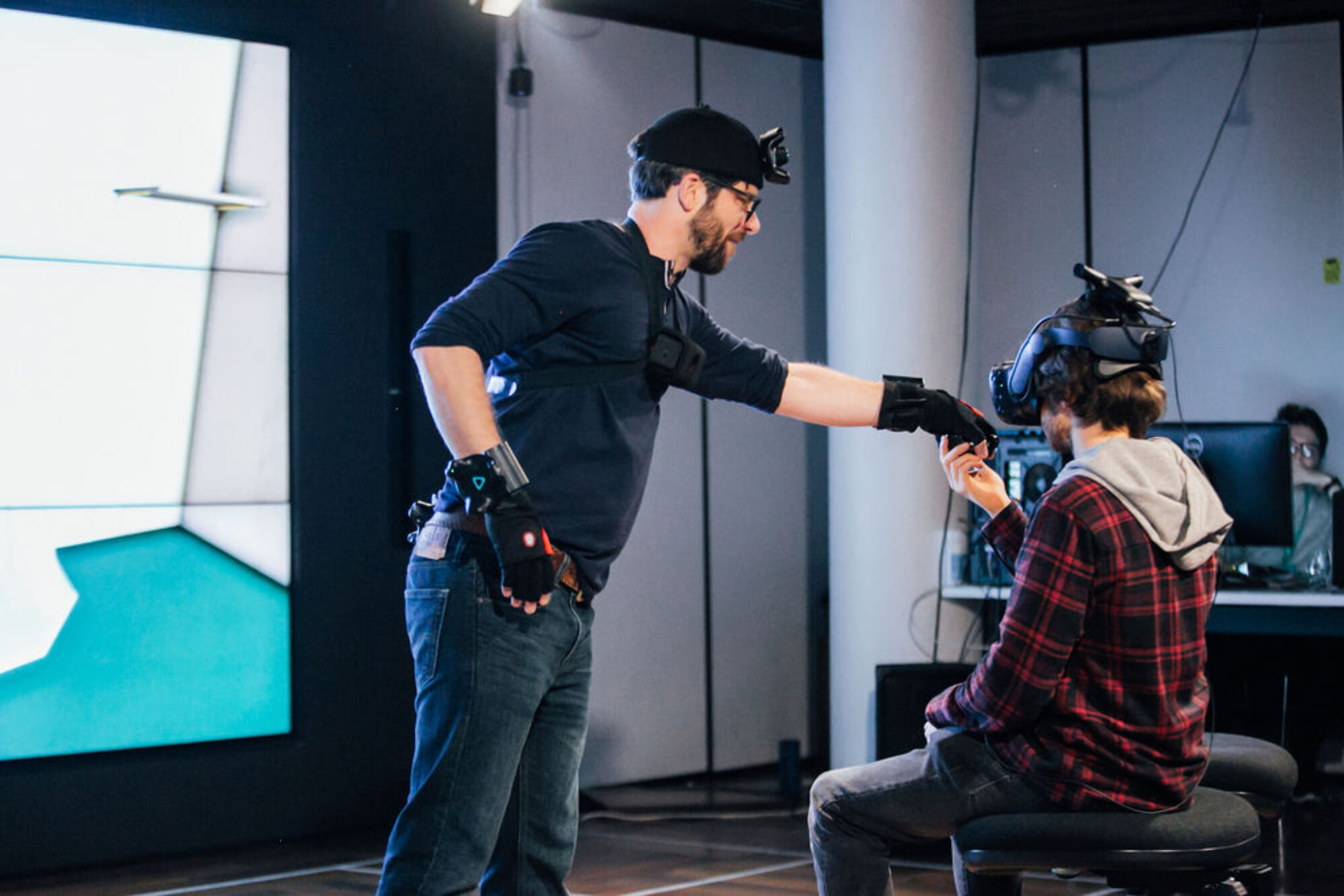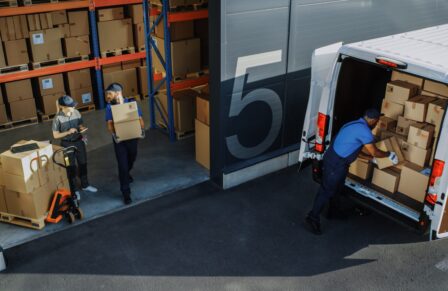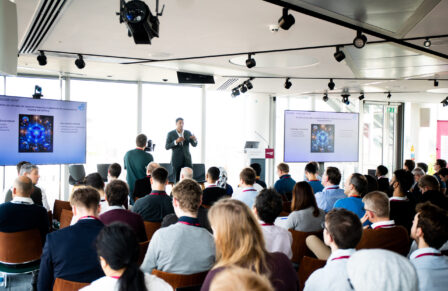How can we make ‘createch’ a priority when bridging the digital skills gap?
Posted 2 Jun 2023
It is widely accepted that investments and initiatives in ‘STEM’ (science, technology, engineering and mathematics) are critical in order to build the skills of the future, and to ensure everyone is equipped with the skills to thrive in the digital age. Indeed, the UK Government reshuffle saw the emergence of the Department for Science, Innovation and Technology (DSIT) earlier this year to build upon the ambitions for the UK to become a “global science superpower.”
Within the framework of STEM, however, the exciting innovation that takes place at the nexus of technology and creativity often goes amiss, as well as the mobilisation of skillsets that are enabled at this convergence and celebrating the power of the arts. As such, the term ‘STEAM’, Science, Technology, Engineering, Arts and Manufacturing, was coined to insert ‘arts’ into the equation.
Alongside, another portmanteau, ‘Createch’, or ‘creative technology’, which refers to the combination of areas and skillsets that further celebrate innovations that bring these well matched areas together. At Digital Catapult our work operates at the centre of the digital and creative industries, supporting innovative companies who are driving the digital future in exciting, and more importantly creative, directions.
Supporting skills at the intersection of the digital and creative industries will be critical to ensure future global competitiveness in technology innovation, leveraging the UK’s strengths in areas such as creative content production, Indeed, the UK government announced the creative industries, in addition to digital and technology, as being one of 5 priority sectors in an investment zones update earlier this year.
One area where this combination is flourishing in the UK is in regards to immersive technologies and their application, including Virtual Reality (VR), Augmented Reality (AR) and Mixed Reality (MR). This piece further explores the growth of Createch skills in this particular area, arguing that further attention might be paid to exploring new training methodologies and further exploring the future skills requirements that will enable the UK to become a global STEAM superpower.
This article has been adapted from an original piece published in Tech Monitor.
Investing in the createch skills of the future
Immersive technologies remain at the epicentre of future-facing innovation activity, with The Data City estimating that the immersive sector could be worth £2.6bn in the UK by 2027. With increasing investment and interest, in part due to renewed global attention on the possibilities of ‘the metaverse’, there are more opportunities than ever to explore the broad-ranging potentiality of advanced digital technologies – particularly virtual and augmented reality – that increasingly blur the distinctions between physical and digital environments.
Skills are a significant part of this broader picture, with innovation and skills two sides of the same coin. In the current context of skills shortages across the nation, immersive technology holds the potential to enhance traditional skills and training methodologies. To deliver impact and to ensure that immersive technologies can support skills initiatives at scale, access to and understanding of the technology across the country is of vital importance.
Skills shortages
The UK faces a challenging skills and labour supply gap across a range of sectors. Digital skill sets are in short supply. There are a number of factors driving these wider-reaching shortages: economic uncertainty in the aftermath of the Covid-19 pandemic, the impact of the UK’s decision to leave the EU on associated flows of migrant labour, and the twin transitions towards digitalisation and net-zero, which are liable to change occupational and job structures. With this in mind, transferable and adaptable skill sets should be a key priority for employers to help drive economic growth across the nation.
More than ever, ensuring that skills and training initiatives align with the evolving needs and requirements of employers in the labour market is vital to ensure that growth hits all parts of the UK, supporting a diverse and inclusive workforce and ensuring that places, and people, are not left behind. The government’s ‘Skills for jobs’ white paper emphasises its focus on ensuring that people across the UK are set up with the skills they need to support key sectors of the economy. In addition to educational qualifications, emphasis has shifted towards the concept of ‘lifelong learning,’ enabling people at all stages of their careers to access the skills they need to be successful no matter their age. Aligning skills in this way is a challenge, and requires ongoing engagement between employers, education providers and policymakers.
Immersive technology’s potentiality
When we talk about truly immersive technologies, like virtual and augmented reality, we refer to the capacity of these technologies to make their users feel part of a digital environment, forging a sense of presence and enabling embodied interactions with digital information. Such capabilities have been proven to positively impact skills training, in contrast to more traditional skills and training methods.
For instance, a study undertaken by PwC showed that VR learners were more likely to be focused, learn more quickly, and be more emotionally connected and confident in applying skills learned in soft-skills training simulations. As such, immersive technologies hold significant potential to support lifelong learning ambitions, innovating beyond traditional learning methods and giving people the opportunity to learn by doing, before doing. VR, for example, has enabled this for over two decades now, from helping to train pilots in flight simulations to allowing trainee doctors to practise procedures on virtual patients.
Skills offerings from immersive companies in the UK continue to evolve. Bodyswaps, an award-winning VR platform that creates realistic simulations with AI-enabled feedback, has developed a number of training applications that enable users to safely practise employability skills such as public speaking, leadership and equality, diversity and inclusion. In its soft-skills framework, the company outlines the design of their applications to elicit emotional engagement, psychological safety and self-coaching to provide personalised experiences that respond to user input.
Bodyswaps previously participated in Digital Catapult’s Augmentor Programme, and have since achieved incredible success in driving immersive skills capabilities forwards. Most recently, the company launched an immersive soft skills training initiative with Meta to give institutions across the UK opportunities to pilot the use of immersive learning. AI-enabled immersive training is also evolving with the use of natural language processing tools like ChatGPT, lowering the costs of immersive content creation for skills and training. VirtualSpeech is just one example of a startup that’s embedded ChatGPT into their immersive simulations, the better for users to interact with avatar characters through real-time generated dialogue.
Investing in createch skills and immersive technology is crucial in bridging the digital skills gap and ensuring a diverse and inclusive workforce. Immersive technologies have the potential to enhance traditional skills and training methodologies, and innovative companies like Bodyswaps and VirtualSpeech are innovating in ways that see immersive technologies combining with other technologies like artificial intelligence. By aligning skills with the evolving needs and requirements of employers, policymakers, and education providers, we can ensure that everyone has the opportunity to access the skills they need to thrive in the digital age. It’s time to prioritise createch skills and invest in the future of immersive technology.
How is Digital Catapult harnessing the power of Createch?
Building on the UK’s rich arts and culture sector Digital Catapult is creating the virtual production facilities of the future. Across the UK we are developing new cutting-edge studio facilities that provide independent media production companies with equipment, space and technology that they would otherwise not be able to access.
Our Advanced Media Production facilities are leading on the design, procurement, set up and operation of 5G enabled Advanced Media Production (AMP) studios.These studios, equipped with a state-of-the-art LED screen, camera tracking and motion capture infrastructure, are leading the way for research and development of advanced production methodologies, hands-on training, hands-on experimentation, training and skills development to address gaps that exist today in the creative industries. The AMP studios are contributing to creating the world’s first fully functioning virtual production research facility to anchor the UK’s leading expertise in this area.
A driving factor for Digital Catapult’s work in the creative sector is to make the UK the best place in the world to create immersive content – our work in virtual environments and cyber physical systems is propelling the UK’s iconic arts and culture sector into the future.
Supporting Createch in the South West of England
From a legacy built on dreams of engineering and invention stretching back well over 200 years, the West of England is now recognised as one of the most innovative regions in the UK, with an award-winning reputation for creative media, film and television production.
Digital Catapult is currently working with the University of Bristol and a range of other partners on MyWorld. MyWorld is a five year project that will build on the production, technology and research strengths of the Bristol and Bath creative cluster to create a globally unique proposition for screen-based media.
MyWorld will forge vital connections between world-leading academic institutions, creative businesses and tech companies including Netflix, Tencent and BT to facilitate knowledge sharing and creative excellence, and is playing a pivotal role in creating research and development pipelines into production, accessible facilities and a framework for talent development, driving investment in the UK’s creative industries.
Artificial intelligence
In the context of current debates, and in light of the publication of the UK AI Whitepaper, understanding the benefits and challenges of AI is of critical importance. Digital Catapult is exploring responsible cross-sector applications of AI through a range of programmes and initiatives. Digital Catapult work with cross-sector businesses at the various stages of their AI adoption journey to help innovate, test and develop proofs-of-concept.
The BridgeAI programme, delivered by InnovateUK in collaboration with Digital Catapult, Hartree Centre and The Alan Turing Institute, is helping businesses in high growth sectors, including the creative industries, to harness the power of AI to become more competitive. The programme offers funding and support to explore responsible AI solutions, access AI expertise and elevate skills.
—
You can stay up to date with Digital Catapult’s work to support ‘createch’ development here.












